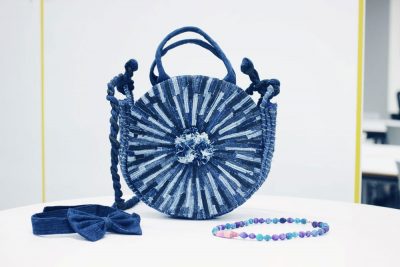
Streaks of blue burst from the center of a circular bag to create a sun-like image. Strips of denim interlace into the strap to form a braid. Beneath the interwoven fabric strips and the round design lies an international story of inclusion and sustainability.
Each strip of fabric used in the purse crosses the Atlantic Ocean multiple times before ending up in the arms of its new owner. The denim originates in jeans sold in American retail stores that venture from rack to closet to donation place, such as the Salvation Army, and eventually pile up in Ghana.
There, Make Fashion Clean enters the process. Millions of jeans are sent to Africa, according to MFC’s website, and the nonprofit ensures used clothing dropped in Ghana by American donation centers are upcycled to provide local artisans with material, according to DL Lundberg, graduate student in School of Public Health and MFC director.
MFC and nonprofit Matilda Flow Inclusion Foundation launched the Blue Circle Bag Kickstarter campaign Nov. 3 to raise funds for the organizations, and it runs until Nov. 27. Ghanaian artisans use the clothing shipped to the country to create totes, necklaces, bracelets, bow ties and the purses sold in the campaign.
Lundberg co-founded both MFC and MFI and said the organizations’ work seeks to break the current system. They explained the majority of clothing ends up in landfills or falls into the hands of traders, who sell the material for low prices and create competition that threatens the livelihoods of the artisans.
“People will pay for the cheaper, second-hand clothes, and so the idea of blue circle bags came in response to, ‘How can we create employment for artisans who have been put out of work … could we actually use the existing second-hand clothes?’” Lundberg said.
Instead, the jeans end up in the workshop of Matilda Lartey, executive director of MFI. Lundberg said they worked with Lartey to establish MFI after they spent two years living in Ghana, where they met Lartey.
“While I was there, I saw firsthand how much second-hand clothing is shipped from the U.S. to Ghana,” Lundberg said.
MFI’s workshop employs 10 artisans and prioritizes inclusion by hiring women and individuals with disabilities, according to Lundberg. Other workers have children with disabilities, including Lartey.
Sarah Bibbey, co-founder and acting director of partnership operations at MFC, said 70 percent of people hired in MFI’s workshop are persons with disabilities. The artisans create the bags, and the denim then returns to the United States in the purses Americans buy.
Lundberg said MFC has received widespread positive feedback about the Kickstarter campaign, and they personally appreciated the artful aspect of the bag.
“It’s been amazing to see how the bag is received from an art level,” Lundberg said. “People seem to really love the circular design, something that has creative value, which is really important to us because the seamstresses we work with are really talented, and it’s important that shines through.”
Bibbey explained the bag’s design holds significance and that it went through multiple design iterations.
“The bag is a circle, and the bag is creating a circular economy, sending denim that has already been sent to Ghana and then back to the U.S.,” Bibbey said.
Lundberg said MFC decided to use denim as the material because after conducting some research, they determined the fabric’s durability was conducive to upcycling.
Cassie Berta, a sophomore in Boston University’s College of Arts and Sciences, wrote in a Facebook message that she appreciated the unique design and was impressed with the creativity and resourcefulness the seamstresses showed by creating these bags.
“Their ability to adapt to the set back by repurposing the fabric is incredibly clever, and something which shows their artistry, resource, and flexibility in a way that brings more beauty into the world,” Berta wrote.
Berta explained she had no idea before looking into MFC that there were side effects to donating second-hand clothes to countries such as Ghana.
“I knew there was some implications of westernizing some countries which have already had a dark history of colonization, but I didn’t think about the actual seamstresses, seamsters, and fabric workers from whom it would eliminate jobs,” Berta wrote.
Bibbey stressed the importance that people learn more about where the donations are going in order to break the cycle.
MFC is one of the early adopters of upcycled fashion, Lundberg said, but they said they anticipate a significant change soon in how the industry approaches sustainability.
“We really believe upcycled fashion is the future,” Lundberg said. “We believe in five or 10 years there will be a lot more upcycled fashion.”



























































































































